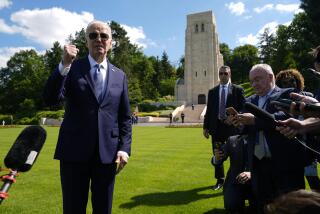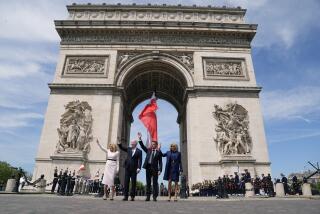France Backs Bush on Bosnia ‘No-Fly’ Action
- Share via
PARIS — Stopping in Paris on his way home from Moscow, President Bush won French support Sunday for the U.S. plan to enforce a military “no-fly zone” over Bosnia-Herzegovina, where Serbian forces have waged a bloody war of “ethnic cleansing.”
France, which has more than 5,000 troops among the U.N. forces on the ground in the former Yugoslav federation, had hesitated to back enforcement of the no-fly zone imposed by the United Nations in October because of fears that Serbian fighters would retaliate against the relatively unprotected ground troops.
On Sunday, however, Bush reassured French President Francois Mitterrand that the safety of French and other European troops would be taken into consideration before U.S. warplanes acted against Serbian positions. The United States has no ground troops among U.N. peacekeeping forces based in Bosnia and neighboring Croatia.
“We are very sensitive to the fact that others have troops on the ground in Yugoslavia,” Bush said at a press conference after a two-hour meeting with the French president. “We would not act precipitously to do anything unilaterally that would put these troops in further danger.”
Mitterrand, who in an emotional New Year’s message had described the Bosnian capital of Sarajevo as a “martyred city,” said the French government will back a U.N. resolution for enforcement of the no-fly zone as early as this week if last-ditch peace talks under way in Geneva fail to make progress.
In the second day of the Geneva talks Sunday, leaders of the three main ethnic groups in Bosnia--Muslims, Croats and Serbs--debated a proposal to settle the civil war by dividing the country into 10 autonomous provinces, each with a majority population of one of the three ethnic groups and governed by a weak federal government.
According to an Associated Press account of the meeting, however, the proposal by the co-chairmen of the peace talks, American Cyrus R. Vance, representing the United Nations, and British statesman Lord Owen, representing the European Community, met with little enthusiasm from the ethnic leaders.
Alija Izetbegovic, president of the Muslim-led Bosnian government, said negotiators would have to make “many corrections” to the map proposed by Vance and Owen.
The proposal “can be a basis” for a solution, he said, “but we want a modern state without ethnic divisions.”
Vance and Owen avoided using ethnic divisions as the sole basis for the proposed provinces, but each province would have a dominant ethnic group.
Hajrudin Somun, Izetbegovic’s foreign policy adviser, said the Muslim side also rejected a confederation of provinces, any one of which might eventually hold a referendum and join either Serbia or Croatia.
“We want a democratic state with strong central government and with strong provinces,” Somun said.
While the leaders met in one room of the Palais des Nations, the European headquarters of the United Nations, their military aides held their own session to discuss how to implement a cease-fire if the leaders should agree to one.
In Paris, Bush said he expects a U.S.-backed U.N. resolution to enforce the ban of Serbian military flights over Bosnia-Herzegovina to be approved fairly soon.
Although the U.S. and French leaders appeared to be in agreement in dealing with the conflict in the Balkans, both admitted they had made little progress in their attempts to break a Franco-U.S. deadlock over agricultural subsidies that has blocked attempts to conclude a broad international trade agreement.
“We didn’t make any progress,” Mitterrand said.
“There are known differences, and we didn’t eliminate them,” Bush agreed.
But the agricultural trade dispute did not cloud the sentimental atmosphere surrounding Bush’s five-hour visit to the French capital, where he and Mitterrand later dined on shellfish, roast capon and wild mushrooms. Aides said the Paris stop is almost certainly the last overseas state visit made by Bush as President.
The two leaders at the diplomatic last supper of a lame-duck U.S. President, lubricated by 20-year-old Bordeaux wine and champagne, were joined by Barbara Bush, former Secretary of State James A. Baker III, who is now White House chief of staff, National Security Adviser Brent Scowcroft and most of the senior ministers in the French government.
Bush and the 76-year-old French president have a personal relationship that dates to Bush’s early years as vice president in the Reagan Administration.
When Mitterrand, a Socialist, was first elected president in 1981, an alarmed President Reagan dispatched Bush to check out the new French leader. Bush, dismissing fears that Mitterrand posed a left-wing threat, returned with a positive report.
Since then, the two men have met more than 25 times and reportedly talk frequently by telephone.
After Bush concluded a long, self-serving statement in which he promised that he would not intervene in foreign policy issues after he leaves office, Mitterrand joked back sarcastically by saying, “Let us conclude the press conference on that fine civics lesson.”
More to Read
Sign up for Essential California
The most important California stories and recommendations in your inbox every morning.
You may occasionally receive promotional content from the Los Angeles Times.










